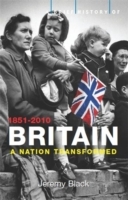-
Zusatztext
-
From the Great Exhibition to the Credit Crunch -- the transformation of Britain from the world's greatest nation to the present day. In 1851 Queen Victoria opened the Great Exhibition in Hyde Park, it was the high water mark of English achievement -- the nation at the forefront of the Industrial Revolution, at the heart of a burgeoning Empire, with a queen who would reign for another 50 years. In the following 150 years, the fate of the nation has faced turmoil and transformation. But it is too simple to talk of decline? Has Great Britain sacrificed its identity in order to stay part of the present world order. Leading historian, Jeremy Black, completes the landmark four volume Brief History of Britain series with a brilliant, insightful examination of how present day Britain was formed.
-
-
Kurztext
-
From the Great Exhibition's showcasing of British national achievement in 1851 to the opening ceremonies of the Olympics in Stratford in 2012 and on to Brexit, an insightful exploration of the transformation of modern BritainThis revised and updated fourth and final volume in the concise Brief History of Britain series begins in the specially-constructed Crystal Palace, three times the length of St Paul's Cathedral, in Hyde Park at the beginning of the second half of the nineteenth century. The Great Exhibition it housed marked a high point of British national achievement, at the forefront of the Industrial Revolution, at the heart of a great empire, with Queen Victoria still to reign for fifty years. It was a time of confidence in the future, and exuberant patriotism for Britain's role in it.The beginning of the Second World War in 1939 marks a turning point because of the great change it heralded in Britain's global standing. At its peak, protected by the world's greatest navy, the British Empire stretched from Australasia to Canada, from Hong Kong and India to South Africa, and from Jamaica to the Falklands. Now the empire is no more: a fundamental change not only for the world, but also for Britain. The Second World War had been won, but it had exhausted Britain and marked the beginning of its national decline.Black links cultural and political developments closely - transport, health, migration and economic and demographic factors - in order to make clear how porous and changeable the manifestations of national civilisation can be, and to make sense of themes such as the triumph of town over country, Britain's international clout and the shift from the dominance of the market at the turn of the nineteenth century to the growing significance of the state. Importantly, he also looks at how public history has presented the nation's past, and how the changing and different ways we look at that past are central aspects of our shared history.
-
Detailansicht
Brief History of Britain 1851-2021
eBook - From World Power to ?, Brief Histories
ISBN/EAN: 9781849018197
Umbreit-Nr.: 3489933
Sprache:
Englisch
Umfang: 160 S.
Format in cm:
Einband:
Keine Angabe
Erschienen am 23.06.2011
Auflage: 1/2011
E-Book
Format: EPUB
DRM: Adobe DRM


